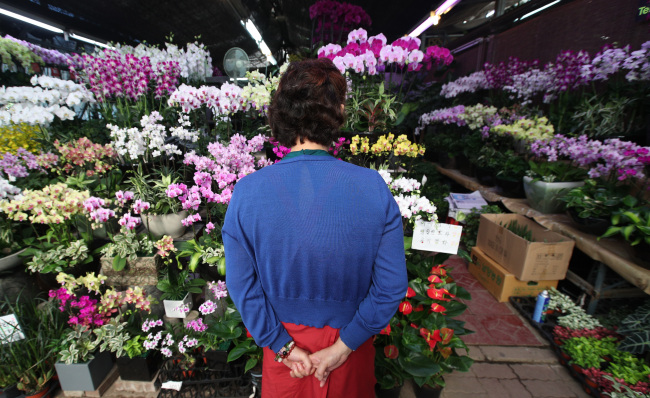The Improper Solicitation and Graft Act has continuously been questioned over the crippling effect it allegedly holds over domestic consumption, but after a year in implementation, its impact on most sectors of the economy turned out to have been limited, according to the latest data.
The anti-graft law, often dubbed the Kim Young-ran law after its initiator, did weigh down on upmarket restaurants, floricultural industries and liquor shops but key economic indexes displayed little fluctuation, the data showed.
According to Statistics Korea, the production index for the restaurant and bar cluster in the fourth quarter last year -- the first quarter since the law effectuation -- fell by 3.8 percent from the previous quarter.
The corresponding figure fell by another 3.8 percent in the first quarter this year and 2.9 percent in the following quarter.
Also, the use of corporate credit cards in flower shops and drinking bars fell by 11.4 percent and 11.2 percent on-quarter in October-December last year, data showed.

A shop owner at Yangjae Flowering Plant Joint Market. (Yonhap)
The production index for the service industry in general, however, inched up from 2.5 percent in the fourth quarter last year to 2.7 percent in the second quarter this year.
Market observers also suggested that the stagnation in specific industries may not necessarily be attributed to the anti-graft law, pointing out to the corruption scandal of then-President Park Geun-hye in the late part of last year which led to the general depression of local industries.
“Restaurants and bars ride heavily on the flow of the economy,” said an official of Statistics Korea.
“One should take into consideration that consumption was low in the fourth quarter last year (when evaluating market indexes).”
The Consumer Composite Sentiment Index fell from 101.7 in September to 95.8 in November, indicating an overall fall in the market’s eagerness toward consumption, BOK data showed.
“Impact on the flower and food and market sectors was inevitable, but the anti-graft law cannot be seen as having swayed key economic indexes such as employment and production,” said Joo Won, chief researcher at Hyundai Research Institute.
“What we need is a supplementary set of measures to flexibly readjust the amount cap in the given regulations.”
The anti-graft act, which took effect on Sept. 28 last year, places a 30,000 won, 50,000 won and 100,000 won ceiling on the value of meals, gifts and congratulatory or condolence money offered to government officials, journalists and teachers.
By Bae Hyun-jung (
tellme@heraldcorp.com)






